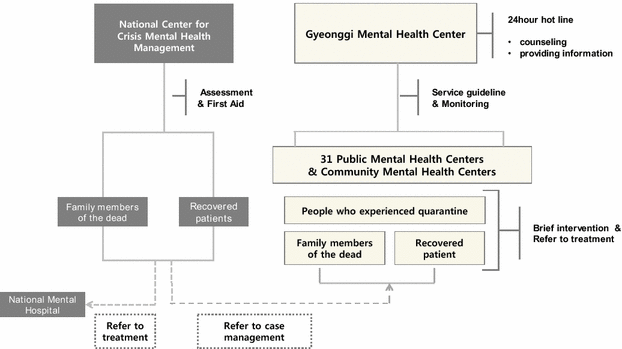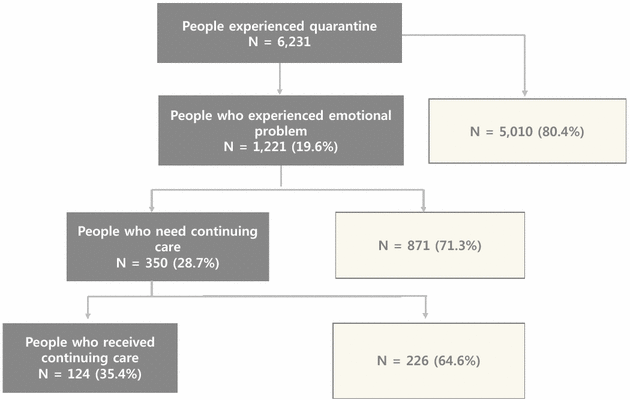System effectiveness of detection, brief intervention and refer to treatment for the people with post-traumatic emotional distress by MERS: a case report of community-based proactive intervention in South Korea
- PMID: 27504141
- PMCID: PMC4976505
- DOI: 10.1186/s13033-016-0083-5
System effectiveness of detection, brief intervention and refer to treatment for the people with post-traumatic emotional distress by MERS: a case report of community-based proactive intervention in South Korea
Abstract
Background: Korea has experienced diverse kind of disasters these days. Among them the 2015 middle eastern respiratory syndrome (MERS) outbreak imposed great psychological stress on almost all Korean citizens. Following the MERS outbreak, government is reviewing overall infectious disease management system and prioritizing the establishment of mental health service systems for infectious disease. This study makes suggestions for implementing disaster-related mental health service systems by analyzing the example of Gyeonggi Province, which proactively intervened with residents' psychological problems caused by the large-scale outbreak of an infectious disease.
Case description: Mental health service system for MERS victims had the following two parts: a mental health service for people who had been placed in quarantine and a service provided to families of patients who had died or recovered patients. The government of Gyeonggi province, public health centers, regional and local Community Mental Health Centers and the National Center for Crisis Mental Health Management participated in this service system. Among 1221 Gyeonggi people placed in quarantine and who experienced psychological and emotional difficulties, 350 required continuing services; 124 of this group received continuing services. That is, 35 % of people who required psychological intervention received contact from service providers and received the required services.
Conclusions: This study reflects a proactive monitoring system for thousands of people placed under quarantine for the first time in Korea. It is significant that the service utilization rate by a proactive manner, that is the professionals administering it actively approached and contacted people with problems rather than passively providing information was much higher than other general mental health situation in Korea. The core value of public mental health services is adequate public accessibility; it is therefore essential for governments to strengthen their professional competence and establish effective systems. These criteria should also be applied to psychological problems caused by disastrous infectious disease outbreaks.
Keywords: Community mental health; Disaster; MERS; Post-traumatic stress.
Figures
References
-
- The government of Gyeonggi Province. MERS inside 2015. Suwon. http://ebook.gg.go.kr/home/view.php?host=main&site=20151222_153922&listP.... Accessed 15 Apr 2016.
-
- Ministry of Public Safety and Security . List of disasters in Korea 2014. Seoul: Ministry of Public Safety and Security; 2014.
-
- Ministry of Health and Welfare. Middle east respiratory syndrome information, the current status of MERS in 2015 of South Korea. Sejong: Center for Disease Control. http://www.mers.go.kr/mers/html/jsp/Menu_B/content_B1.jsp. Accessed 15 Apr 2016.
-
- Sturges DL. Communicating through crisis, a strategy for organizational survival. Manag Commun Q. 1994;7:297–316. doi: 10.1177/0893318994007003004. - DOI
-
- Lee SA. Research on risk communication strategy of Korean Government, the case study on MERS epidemic. Seoul: Hanyang University; 2016.
LinkOut - more resources
Full Text Sources
Other Literature Sources



